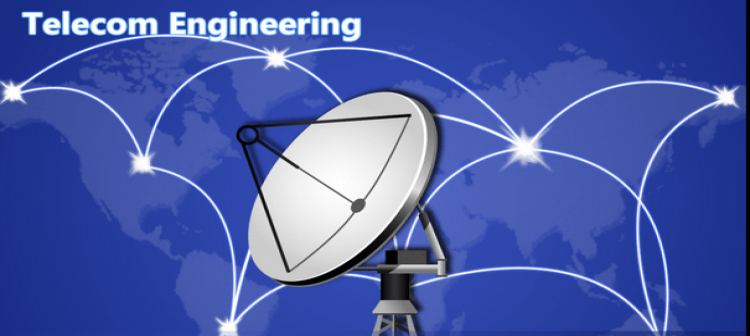What can I do with a Telecommunication Degree?

Telecommunication Engineering is focused on the devices and mediums used to transmit communications information in the form of words, sounds or images over great distances. Telecommunication engineering works with antenna, satellite, transmitter, receiver, transistor, ICs, capacitor, micro controllers, microprocessors, microwaves, signal modulation. It basically deals with how communication is established between one device to another device with how long without any noise, through which medium and what other processes and devices have taken place. The B.Tech Telecommunication is one of the popular courses that are offered in top engineering colleges in Bangalore.
B.Tech/BE Telecommunication
- The B.Tech/BE Telecommunication Engineering is an 4-years undergraduate course that is divided into 8-semesters
- The course aims at teaching students about the new telecom trends in the industry and various other things like networking basics, the infrastructure of telecom, standards of mobile communication and designing of the work
- The course further tells the students about the IT applications used in the telecom sector, about how the programming of mobile apps is done and details of digital communication
- The course deals with multidisciplinary subjects such as electronics, telecommunications, electrical, computer science etc
Career & Scope
The B.Tech/BE Telecommunication Engineering students have excellent career scope and growth. They are hired in both government and private organisations. They are well-paid and have excellent career growth in the field of telecommunications.
Some of the job roles available for Telecommunication Engineers are:
Telecommunication Engineers:
- Telecom engineers regularly interact with co-workers, customers or other technicians.
- In this role, you are responsible for managing telecom infrastructure, routers and computer networks.
- Telecommunications engineers also need a good understanding of VoIP and telephony networks, cabling standards, WAN protocols and ISO documentation.
- Telecommunications engineers are expected to solve problems, assess situations and apply solutions using their knowledge of telecommunications, including ISDN, analog, T1, T2, SONET and ATM.
- The Telecommunication engineers are expected to understand how telecommunications systems – including voice, data, radio, fibre optics and waves – work and are equipped to handle disruptions of service and come up with solutions to deal with problems as they may arise.
- The telecommunications engineers are required to design and create telecommunications systems.
- The telecommunications engineers are required to Plan, design, commission and monitor the complex telecommunication equipment and facilities and associated broadcasting equipment
Average Salary Range: 4 LPA to 6 LPA
Telecom Specialists:
- The Telecoms specialists are required to coordinate, manage or support the design of service products and devices.
- The telecom specialists are required to manage, supervise and provide technical advice/guidance on telecommunication systems
- The telecom specialists are responsible to monitor and test systems/peripheral equipment as well as troubleshooting problems in them
- The telecom specialists are expected to evaluate systems performance at regular intervals and should bring the necessary changes as required
- Overseeing and coordinating all telecommunication activities
- Purchasing electronic equipment/systems and preparing budgetary justifications for reporting to upper management
- The telecom specialists are expected to document plans, activities, requests, and specifications for various telecommunication at regular intervals
- The telecom specialists are required to design programming features, design systems and networks
Average Salary Range: 5 LPA to 7 LPA
Equipment Installation Engineers:
- The equipment installation engineers are also known as telecom technicians who work in this field usually handle telecom equipment maintenance and repairs.
- The equipment installation engineers are responsible for planning network installations, troubleshooting outages, testing circuits and preparing installation diagrams.
- The equipment Installation engineers are responsible to replace existing semiconductor equipment, semiconductor fab and fab support systems to the new ones regularly
- The equipment installation engineers are expected to lead projects across multiple teams by coordinating with all the team members
- The equipment installation engineers are required to maintain the existing semiconductors and replace with new ones accordingly
- The equipment installation engineers are required to monitor for any flaws in the semi-conductors and find solutions for the same
Average Salary Range: 3 LPA to 5 LPA
Telecom Project Managers:
- The telecom project managers are responsible for developing personnel policies and procedures, directing specific projects and making adjustments when needed, ensuring timely installations, implementing network security policies and more.
- The telecom project managers are expected to handle a variety of projects while ensuring compliance with the estimated timelines and costs.
- The telecom project managers are expected to work in tandem with the team members and the clients and ensure that work is supervised and completed within the deadlines
- The telecom project managers are responsible to supervise multiple teams and ensure that all the teams meet the client requirements
Average Salary Range: 6 LPA to 8 LPA
Top Organisations hiring B.Tech/BE Telecommunication Engineering students
Some of the top organisations hiring B.Tech/BE Telecommunication engineering students are:
- BHEL
- BEL
- Vodafone
- Airtel
- Nokia
- Samsung
- Verizon



Comments